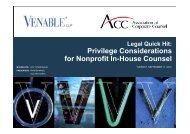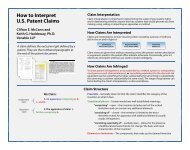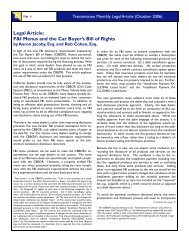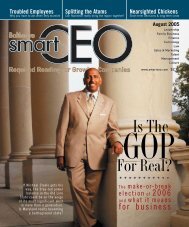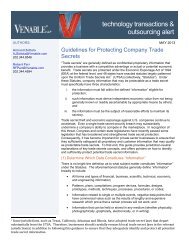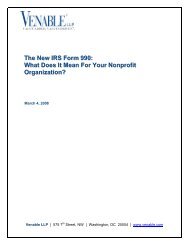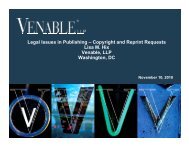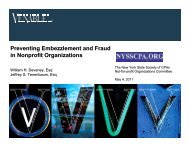Employers Face Significant New Challenges Under ... - Venable LLP
Employers Face Significant New Challenges Under ... - Venable LLP
Employers Face Significant New Challenges Under ... - Venable LLP
You also want an ePaper? Increase the reach of your titles
YUMPU automatically turns print PDFs into web optimized ePapers that Google loves.
LABOR & EMPLOYMENT NEWS ALERT OCTOBER 16, 2007 2<br />
Article 49B (prior to<br />
October 1, 2007)<br />
Amended Article 49B (effective<br />
October 1, 2007)<br />
State Court Action Not available Available for claims accruing on or<br />
after October 1, 2007. The Maryland<br />
Commission on Human Relations<br />
(MCHR) or the individual may sue in<br />
state court.<br />
Relief Available Back pay (limited to 3<br />
years )<br />
Back pay<br />
Reinstatement<br />
Reinstatement<br />
Private Right of Action and the MCHR’s <strong>New</strong> Authority<br />
As of October 1, employees have two options for bringing a discrimination claim. Individuals may take the administrative<br />
route, subjecting employers to a quicker, more flexible, and likely less advantageous hearing process. However,<br />
individuals taking the administrative route can still file suit against their employers. <strong>Employers</strong> may feel pressured by<br />
individuals to settle cases earlier in the process and for more money to avoid a court battle. After 180 days, regardless of<br />
the outcome of the administrative process, individuals may file suit in circuit court. The individual must file suit in the<br />
circuit court of the county where the alleged discriminatory act took place.<br />
The MCHR’s powers include suing on behalf of an individual via the administrative process or suing in circuit court. Both<br />
venues give the MCHR the power to seek expanded damages as described above, and the Office of Administrative<br />
Hearing’s Administrative Law Judges have the power to award those damages. Employees always have the right to opt<br />
out of the administrative process even after that process has begun. Unlike the federal law, employees do not need a<br />
“right-to-sue” letter or any other form of permission from the MCHR to bring suit in Maryland’s circuit courts.<br />
<strong>Employers</strong> May <strong>Face</strong> a Bumpy Road in State Court<br />
Compensatory damages, including<br />
emotional distress and front pay, from<br />
$50,000 to $300,000 depending on<br />
employer size;<br />
Punitive damages if the employer<br />
engaged in an unlawful employment<br />
practice with malice (subject to the<br />
statutory cap from $50,000 to<br />
$300,000 depending on employer<br />
size)<br />
Attorneys’ fees, expert witness fees,<br />
and costs<br />
Jury Trial Not Available Available where an individual seeks<br />
compensatory or punitive damages.<br />
Employees will likely file most discrimination suits in state court under amended Article 49B. Maryland’s circuit courts and<br />
its judges are likely less familiar than their federal counterparts with the expansive body of discrimination law that has<br />
developed in federal courts since the passage of Title VII. For Maryland employers, this means that the employer-friendly<br />
stance of the Court of Appeals for the Fourth Circuit may not be what state court judges rely on to develop Maryland’s<br />
body of anti-discrimination law. Plaintiffs’ attorneys will likely seek to bring the best cases forward to Maryland’s court<br />
system to test the legal waters and develop law favorable to their clients. Additionally, employers may find themselves<br />
facing juries in state court because state court judges, for the most part, have not presided over as many discrimination<br />
cases as their counterparts have.<br />
VALUE ADDED, VALUES DRIVEN. ®




